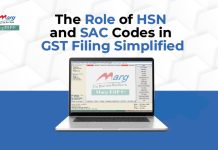GST Rate for 8306 HSN Code
The Goods and Services Tax (GST) system has brought about significant changes in the taxation structure of India. It aims to streamline the tax regime by implementing a single tax rate across various goods and services. One such area covered by the GST is the classification of goods using Harmonized System of Nomenclature (HSN) codes. In this blog, we will focus on HSN code 8306 and delve into the corresponding GST rate.
HSN Code 8306: HSN code 8306 pertains to the classification of “Bells, Gongs, and the Like; Non-Electric, of Base Metal.” This code is used to categorize various metallic bells and gongs that do not rely on electricity for operation. It includes products made of base metals such as copper, iron, brass, or other alloys.
Understanding GST Rates: The GST rate applicable to goods and services is determined by the GST Council, which periodically reviews and revises the rates based on various factors such as revenue collection, industry demands, and economic considerations. The rates are categorized into four slabs: 5%, 12%, 18%, and 28%.
GST Rate for HSN Code 8306: As of my knowledge cutoff in September 2021, the GST rate applicable to HSN Code 8306 was 18%. However, it is important to note that the GST rates are subject to change. Therefore, it is advisable to verify the latest rates with the official GST portal or consult a tax professional for accurate and up-to-date information.
Applicability of GST on HSN Code 8306: If you are involved in the manufacturing, importing, or trading of bells, gongs, or similar non-electric products made of base metal falling under HSN code 8306, you would need to charge GST at the applicable rate while selling these goods. Additionally, you would also need to comply with other GST regulations, such as issuing tax invoices, filing GST returns, and maintaining proper records.
Benefits of GST: The implementation of GST has brought several benefits to businesses and the overall economy. Some of the advantages include:
- Simplified Tax Structure: GST replaced multiple indirect taxes with a single tax, making the tax structure more streamlined and reducing compliance burdens.
- Elimination of Cascading Effect: GST eliminates the cascading effect of taxes by allowing businesses to claim input tax credits, resulting in a reduction in the overall tax burden.
- Increased Transparency: With GST, all transactions are recorded digitally, promoting transparency and reducing the scope for tax evasion.
- Improved Inter-State Trade: The uniform tax structure across states has facilitated smoother inter-state trade, eliminating multiple entry taxes and checkpoints.
Conclusion
Understanding the GST rates for specific HSN codes is crucial for businesses operating in the manufacturing or trading of goods. HSN code 8306 pertains to non-electric bells, gongs, and similar products made of base metal. As of September 2021, the GST rate applicable to this code was 18%, but it is essential to stay updated with the latest rates through official sources. Adhering to GST regulations not only ensures compliance but also contributes to a more transparent and efficient tax system, benefiting businesses and the economy as a whole.
Read more useful content:
Frequently Ask Question
Q1: What is the HSN code 8306?
HSN code 8306 is used to classify “Bells, Gongs, and the Like; Non-Electric, of Base Metal.” It includes metallic bells and gongs made of base metals like copper, iron, brass, or alloys that do not rely on electricity for operation.
Q2: What is the GST rate applicable to HSN code 8306?
As of my knowledge cutoff in September 2021, the GST rate applicable to HSN code 8306 was 18%. However, it is important to check the latest rates on the official GST portal or consult a tax professional for up-to-date information as rates are subject to change.
Q3: Who determines the GST rates for HSN code 8306?
The GST rates, including the rate for HSN code 8306, are determined by the GST Council. It is a governing body comprising representatives from the central and state governments that periodically reviews and revises the tax rates based on various factors.
Q4: Is the GST rate for HSN code 8306 the same for all states in India?
Yes, the GST rate for HSN code 8306 is uniform across all states in India. The implementation of GST aims to create a unified tax structure and eliminate the variations in tax rates that existed under the previous tax regime.
Q5: What are the compliance requirements for businesses dealing with HSN code 8306?
Businesses involved in the manufacturing, importing, or trading of bells, gongs, and similar non-electric products falling under HSN code 8306 need to charge GST at the applicable rate while selling these goods. They should also comply with other GST regulations, such as issuing tax invoices, filing GST returns, and maintaining proper records.
Q6: Can I claim an input tax credit (ITC) on the GST paid for goods under HSN code 8306?
Yes, businesses can claim an input tax credit (ITC) on the GST paid for goods falling under HSN code 8306, provided they use those goods for further taxable supplies. It is important to follow the prescribed guidelines and maintain the necessary documentation to avail of ITC.
Q7: Are there any exemptions or concessions available for HSN code 8306?
Exemptions or concessions under GST are subject to specific notifications issued by the government. As of now, there are no known exemptions or concessions applicable to HSN code 8306. It is advisable to stay updated with the latest notifications from the government for any changes or new exemptions.
Q8: Are there any specific requirements for exporting goods under HSN code 8306?
Exporting goods falling under HSN code 8306 may involve compliance with customs regulations and documentation. It is essential to understand the export procedures, including the filing of shipping bills, obtaining necessary export licenses, and complying with any specific requirements laid down by the customs authorities.




















